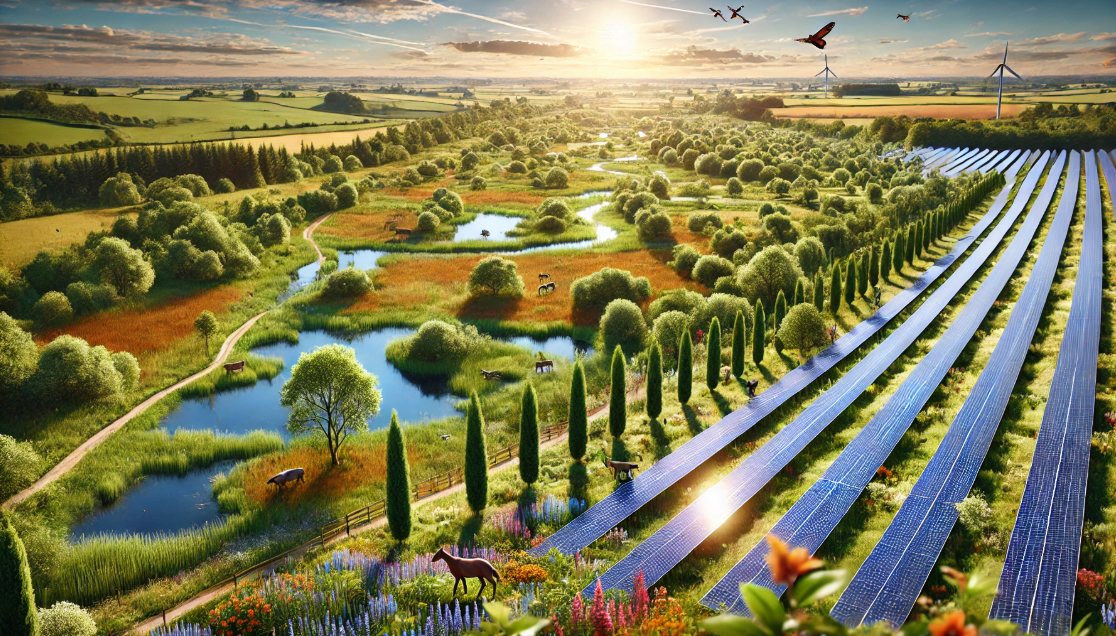Midlands Solar Farm: A Beacon of Biodiversity and Renewable Energy
In the heart of the Midlands, an innovative solar farm project is set to redefine the relationship between renewable energy and ecological preservation. Known initially as the Great North Road Solar Park, the project has been rebranded as the Great North Road Solar and Biodiversity Park to reflect its dual focus on sustainable energy and biodiversity enhancement. Led by Elements Green, this ambitious initiative promises to become a model of environmental stewardship and renewable innovation.
A Collaborative Vision for Nature
Situated near Newark, Nottinghamshire, the project has gained substantial backing from key environmental organizations, including the RSPB, Sherwood Forest Trust, Nottinghamshire Wildlife Trust, and The Trent Rivers Trust. These partnerships aim to ensure the solar farm’s development benefits not just the energy grid but also the local wildlife and communities.
Mark Noone, UK Project Director at Elements Green, highlighted the transformative potential of this project, saying, “This is more than just a solar farm—it’s a step toward cleaner energy, richer biodiversity, and a healthier environment.”
An Ecological Commitment
The Great North Road Solar and Biodiversity Park is poised to dedicate an impressive 850 acres of land solely to ecological management. This effort will include:
- Planting 50,000 new trees to combat flooding and improve biodiversity.
- Developing wetlands and grasslands to provide habitats for diverse wildlife.
- Establishing 25km of hedgerows, a length surpassing the Brian Clough Way, to support pollinators and other species.
- Creating 20km of footpaths, offering the public increased access to natural spaces.
These efforts are designed to enhance the local environment while fostering a connection between the community and its natural surroundings.
Integrating Clean Energy and Habitat Restoration
Charlotte Martin-Taylor, Head of Business Conservation Advice at the RSPB, underscored the importance of such initiatives in addressing today’s urgent environmental challenges. She remarked, “This partnership highlights the vital role businesses can play in creating a future where wildlife and clean energy thrive.”
The project will not only generate renewable energy but also provide large-scale habitat restoration to support priority species. It is a bold example of how energy infrastructure can coexist with and even benefit the environment.
Boosting the Community and Economy
In addition to its environmental advantages, the Great North Road Solar and Biodiversity Park is expected to have a significant socio-economic impact. It could create approximately 460 new jobs and contribute hundreds of millions of pounds to the regional economy, fostering growth and sustainability for Nottinghamshire.
The Road Ahead
Currently in the pre-application phase, the project is projected to begin construction in 2027 and become operational by 2029. If realized, it will serve as a landmark example of how renewable energy projects can actively promote biodiversity and community well-being.
As the Great North Road Solar and Biodiversity Park moves closer to becoming a reality, it stands as a shining testament to what can be achieved when innovation, conservation, and sustainability converge. #BiodiversityHaven #SolarPower #GreenEnergy #Nottinghamshire #EcoPartnerships #SustainableFuture #RenewableEnergy #WildlifeConservation

